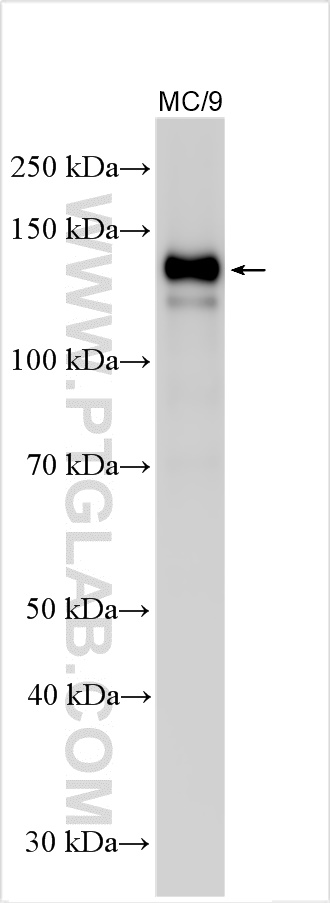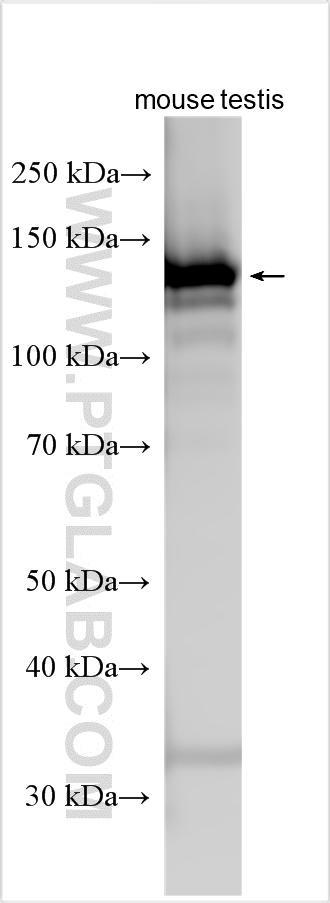验证数据展示
经过测试的应用
| Positive WB detected in | MC/9 cells, mouse testis tissue |
推荐稀释比
| 应用 | 推荐稀释比 |
|---|---|
| Western Blot (WB) | WB : 1:2000-1:10000 |
| It is recommended that this reagent should be titrated in each testing system to obtain optimal results. | |
| Sample-dependent, Check data in validation data gallery. | |
产品信息
31337-1-AP targets CD117/c-Kit in WB, ELISA applications and shows reactivity with mouse samples.
| 经测试应用 | WB, ELISA Application Description |
| 经测试反应性 | mouse |
| 免疫原 |
Recombinant protein 种属同源性预测 |
| 宿主/亚型 | Rabbit / IgG |
| 抗体类别 | Polyclonal |
| 产品类型 | Antibody |
| 全称 | kit oncogene |
| 别名 | Kit, CD117, c KIT |
| 计算分子量 | 109 kDa |
| 观测分子量 | 140 kDa |
| GenBank蛋白编号 | NM_001122733.1 |
| 基因名称 | CD117 |
| Gene ID (NCBI) | 16590 |
| RRID | AB_3669950 |
| 偶联类型 | Unconjugated |
| 形式 | Liquid |
| 纯化方式 | Antigen affinity purification |
| UNIPROT ID | P05532-1 |
| 储存缓冲液 | PBS with 0.02% sodium azide and 50% glycerol, pH 7.3. |
| 储存条件 | Store at -20°C. Stable for one year after shipment. Aliquoting is unnecessary for -20oC storage. |
背景介绍
CD117, also known as c-Kit and SCFR, is a transmembrane protein with tyrosine kinase activity encoded by the oncogene c-kit (PMID: 2448137). It is a member of the type III receptor tyrosine kinase family, which also includes CSF-1R, PDGFRβ, PDGFRα, and FLT3 (PMID: 29518044). CD117 is expressed on hematopoietic stem cells and progenitor cells, mast cells, and is also found in a wide range of non-haemopoietic cell types (including melanocytes, germ cells, astrocytes, renal tubules, breast glandular epithelial cells, sweat glands, and interstitial cells of Cajal) (PMID: 10582338; 23073628). CD117 plays an important role in early haemopoiesis. It is also involved in pigmentation, fertility, gut movement, and some aspects of the nervous system (PMID: 23073628).
实验方案
| Product Specific Protocols | |
|---|---|
| WB protocol for CD117/c-Kit antibody 31337-1-AP | Download protocol |
| Standard Protocols | |
|---|---|
| Click here to view our Standard Protocols |



